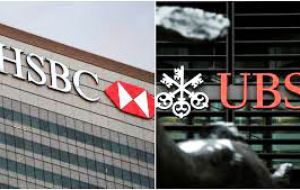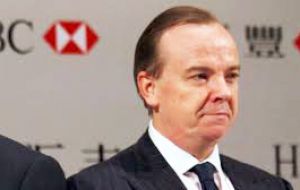MercoPress. South Atlantic News Agency
HSBC and UBS preparing to move abroad when UK leaves the EU
 Statements from the two banks come just after UK Prime Minister Theresa May outlined the UK government's Brexit negotiating strategy
Statements from the two banks come just after UK Prime Minister Theresa May outlined the UK government's Brexit negotiating strategy  Gulliver said HSBC: “specifically what will happen is those activities covered by European financial regulation will need to move, looking at our own numbers”.
Gulliver said HSBC: “specifically what will happen is those activities covered by European financial regulation will need to move, looking at our own numbers”.  Chairman of HSBC, Douglas Flint, told a committee of MPs that 1,000 jobs at his bank's London offices would move to France once Brexit was triggered
Chairman of HSBC, Douglas Flint, told a committee of MPs that 1,000 jobs at his bank's London offices would move to France once Brexit was triggered Two of the largest investment banks in the City of London have confirmed that some staff will definitely have to move abroad when the UK leaves the EU. HSBC's chief executive, Stuart Gulliver, told Bloomberg he was preparing to move 1,000 staff from London to Paris. And Axel Weber, boss of Swiss bank UBS, told BBC “about 1,000” of its 5,000 London jobs could be hit by Brexit.
The comments underline that many thousands of banking jobs may move.
The statements from the two banks come just a day after UK Prime Minister Theresa May outlined the UK government's Brexit negotiating strategy which would, she said, involve leaving both the European single market and the EU's customs union.
UK citizens voted in a referendum last June that the country should leave the European Union. Since then, there has been widespread speculation that many financial jobs based in London might migrate to cities in the rest of Europe, such as Dublin, Paris or Frankfurt, so that the banks concerned could continue to offer their services to EU clients.
Mr. Gulliver said his bank was in no rush, but added: “Specifically what will happen is those activities covered specifically by European financial regulation will need to move, looking at our own numbers.
”That's about 20% of the revenue,“ he told Bloomberg Television at the World Economic Forum in Davos, Switzerland. But he added: ”I don't see the foreign exchange market moving, the investment grade bond market moving, the equity market moving and the high-yield bond market moving.“
HSBC has already said that post-Brexit it would keep its global headquarters in London and its UK headquarters in Birmingham. And Mr Gulliver explained that HSBC was helped by the fact that it already had a bank established within the EU as it had bought Credit Commercial de France in 2002. But he said the position for other banks was different.
”Some of our other fellow bankers have to make decisions pretty quickly now - given that the UK said it will come out of the single market - about applying for banking licenses in some of the EU countries. We don't have to do that,“ he said.
Last week, the chairman of HSBC, Douglas Flint, told a committee of MPs that 1,000 jobs at his bank's London offices would move to France once Brexit was triggered, a point his bank first made in the aftermath of the referendum last June.
UBS chief executive Sergio Ermotti told Bloomberg he would have a better idea towards the end of 2017 about how many jobs at his bank will need to move out of London. But one of his senior executives, Andrea Orcel, also speaking at Davos, said: ”With Brexit we will have to [move] and the question is how many.
“That will very much depend on the agreement that the UK will reach with the EU - but we will definitely have to go.” Mr Orcel added that his bank was “anticipating the worst”.
He explained that if the UK and the EU did not reach any sort of transition deal about Brexit, then some of his staff in London would have to be moved as soon as the UK government invoked Article 50, the legal procedure to leave the EU.




Top Comments
Disclaimer & comment rulesCommenting for this story is now closed.
If you have a Facebook account, become a fan and comment on our Facebook Page!